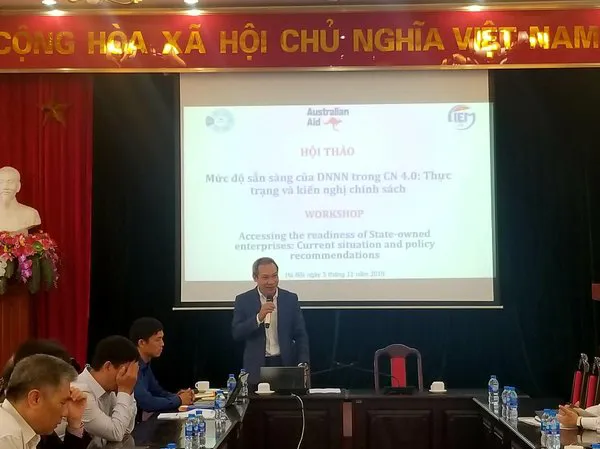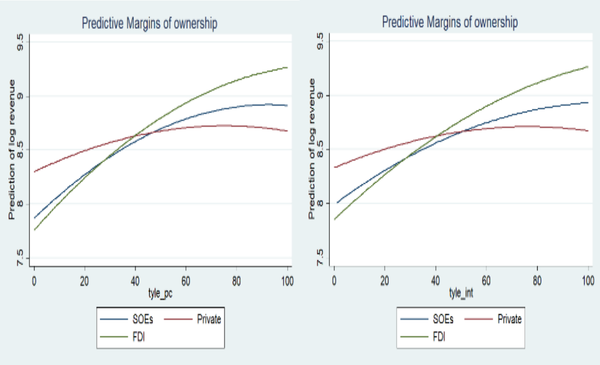Vietnam’s state firms trail behind in digitalization process
From the state firms’ perspective with the priority of ensuring no loss to state capital, investments in innovation pose high risks due to its uncertain nature, which could translate into successes into the long term or not.
Despite holding a key role in Vietnam’s economy, the state corporate sector is trailing behind other economic groups, particularly the private sector, in the digitalization process, according to Phan Duc Hieu, vice director of the Central Institute for Economic Management (CIEM).
| Overview of the workshop. Source: Ngoc Thuy |
“The number of state-owned enterprises (SOEs) operating in fields of science and technology is much lower than in highly profitable and risky businesses such as real estate,” Hieu said at a workshop under the program “Australia supports Vietnam’s economic reform” (Aus4Reform) on November 5, discussing SOEs’ readiness in the Industry 4.0 .
Out of 20 sectors and industries in the economy, SOEs dominate in just three namely banking and finance, production and distribution of electricity and gas, and entertainment.
Except for major state firms such as Viettel, Vietnam Electricity (EVN) and large-scale banks with high level of readiness for the Industry 4.0, most are at the doorstep of the digitalization process, Hieu said.
Hieu pointed to six challenges for SOEs in their quests towards digitalization:
Firstly, limited capabilities in digitalizing and personalizing products and services.
Secondly, lack of systematic approach in turning data into value information, supporting the process of innovation and improving business models.
Thirdly, lack of capabilities in analyzing markets and customers, not to mention current laws and legal frameworks restricting SOEs to freely set prices for products and services based on market mechanism.
Fourthly, SOEs are facing a severe shortage of talents in fields of IT, due to legal restrictions that hinder them from paying salaries and wages comparable to what the private sector is offering.
Fifthly, limited resources to promote R&D activities in each SOE.
Sixthly, lack of cooperation between SOEs and other partners for science and technology development, partly due to SOEs’ incapability in fulfilling intellectual property rights and risk management against cyber threats.
“From the SOEs’ perspective with the priority of ensuring no loss to state capital, investments in innovation pose high risks due to its uncertain nature, which could translate into successes into the long term or not,” Hieu said.
Digitalization brings benefits
Tran Toan Thang, director of the World Economic Affairs Department under the National Center for Socio-Economic Information and Forecast (NCIF), said the digitalization process would offer SOEs opportunities to raise productivity and efficiency.
| Prediction of impacts of employees using computers (l) and internet (r) to enterprises' revenue. |
Thang cited a study revealing an addition of 1% of employees using internet would increase revenue by 0.82%, while an increase of 1% of employees using computers lead to a 0.87%-increase in revenue.
However, Thang noted such impacts would only be realized in SOEs operating in the fields of agriculture, manufacturing and processing, wholesale and retail, while there would be minimal or no boost to revenue of enterprises operating in the areas of IT and telecommunications, finance, banking, science and technology.
CIEM’s Vice Director Hieu said a strategy for the Industry 4.0 is needed, including specific regulation related to the state sector.
“SOEs should have flexibility in applying new technologies and adopting the best practices in corporate governance from the private sector,” said Hieu.
Hieu said SOEs are playing key roles in industries supporting innovation such as infrastructure development, social welfare, inclusive development, creating jobs for vulnerable groups and disabled people.
However, “SOEs do not need to play a key role in core technological sectors of the Industry 4.0, which are more suitable to the private sector with greater dynamism and capability of accepting high risks,” Hieu asserted.
Current practices showed only SOEs with strong financial capabilities and self-motivation are moving ahead in the process of preparation for the Industry 4.0. For example, Viettel has made a strong commitment to the government to become a pioneer in the Industry 4.0. The military-run telco is piloting 5G network and cooperating with 23 provinces/cities in Vietnam in building smart cities.
Meanwhile, EVN has adopted a project of applying technologies from the Industry 4.0 in its operation, including blockchain and artificial intelligence.
The Industry 4.0 is expected to transform Vietnam’s economic structure. In the most optimistic scenario, the technological revolution would help boost Vietnam’s GDP by an additional US$28.5 – 63 billion by 2030, equal to an increase of 7 – 16% of the country’s GDP compared to a scenario without the Industry 4.0, stated a CIEM report.













